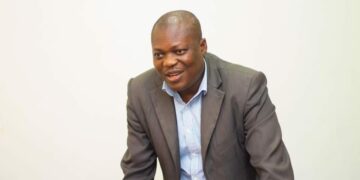RMA Demands Public Inquiry into UniBank Collapse
Revenue Mobilisation Africa (RMA) is demanding an independent public inquiry into the circumstances leading to the collapse of Unibank, following the Attorney General’s recent decision to discontinue criminal proceedings against the bank’s former directors.
At a press conference held in Accra on Friday, August 1, 2025, RMA Executive Director, Geoffrey Ocansey, welcomed ongoing asset recovery efforts but insisted that the state’s decision to abandon prosecution must not come at the cost of transparency, accountability, and justice.
“We welcome the recovery of assets and any effort aimed at safeguarding public resources,” Mr Ocansey stated. “But we are deeply concerned about the long-term implications of how this cleanup exercise was handled and the lack of clarity surrounding the process.”
According to the group, inconsistencies in the financial figures used to justify the revocation of Unibank’s license undermine the credibility of the banking sector clean-up. While former Attorney General Godfred Dame had pegged the bank’s liabilities at GHC5.7 billion, subsequent validations reduced that figure to GHC2.8 billion—eventually reconciled to GHC2 billion in early 2025.
“The figure of GHC5.7 billion, which was widely circulated and may have informed major decisions such as asset seizures, was not supported by the actual records,” RMA asserted. “This raises serious questions about whether key decisions were based on inflated or inaccurate data.”
The group further alleged that at the time of license revocation, the government owed Unibank approximately GHC2.9 billion—an obligation that, if honoured, might have prevented the bank’s insolvency.
Cost to the state
RMA estimates that the overall banking sector clean-up has cost the Ghanaian state over GHC25 billion, largely financed through domestic borrowing, with some assessments pushing the figure to GHC30.3 billion.
“The Ghanaian taxpayer has borne the full brunt of this exercise. Yet, there has been very limited transparency on what has been recovered, how assets were managed, and what remains outstanding,” the advocacy group stated.
While acknowledging Unibank’s transfer of properties valued at over GHC824 million and a projected recovery of US$1.2 billion from third-party loan holdings, RMA maintained that such recoveries do not absolve state actors of accountability.
Key concerns and unanswered questions
RMA raised several critical questions:
Why was the initial GHC5.7 billion figure accepted, and how did it reduce so drastically?
Were state decisions informed by erroneous financial information?
What became of Unibank’s assets under receivership—were they undervalued or sold below market price?
Was liquidation the only option, or was recapitalisation feasible?
Did the state honour its financial obligations to the bank prior to revocation?
The group also questioned the legal and administrative costs incurred during the receivership and demanded evidence that due process under the Banks and Specialised Deposit-Taking Institutions Act, 2016 (Act 930), was strictly adhered to.
Six key demands
RMA presented six key demands to government and regulators:
An independent public inquiry into the roles played by the Bank of Ghana, the Receiver, and both the current and former Attorneys General in Unibank’s closure.
Prosecution of public officials who misrepresented financial data or mishandled the bank’s assets.
Reversal of suspect asset transfers, especially those involving politically exposed persons or below-market valuations.
A forensic audit of the Receiver’s activities, including asset valuations and decisions on liquidation.
Legislative reforms to Act 930 to introduce mandatory parliamentary oversight in future bank resolution processes.
Creation of a Financial Sector Ombudsman, as seen in South Africa and the UK, to ensure oversight and safeguard public interest.
Call for broader civic action
RMA urged civil society, organised labour, and the private sector to rise up and demand accountability from the state.
“To private sector players, your silence is dangerous. You must demand a system that protects investments and respects due process,” said Mr Ocansey. “To workers and unions, stand in solidarity with the hundreds who lost jobs. This is about fairness, justice, and national development.”
He cautioned that the opaque circumstances surrounding Unibank’s collapse could erode public confidence in the nation’s financial and legal institutions.
“The actions and inactions of key state actors, including the Attorney General and the Receiver, have led to significant financial loss to the state and individuals,” Mr Ocansey said. “If Ghana is to restore investor confidence and build a fairer economy, this matter must not be swept under the carpet.”
RMA concluded that only a transparent, inclusive, and accountable process can forestall future crises and help rebuild trust in the country’s financial architecture.








